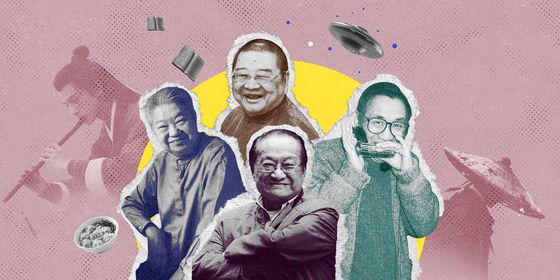Trendy “gangster” terms for the society bro
Peppa, the rambunctious star of the BBC children’s cartoon Peppa Pig, has become one of China’s most beloved animated icons since first appearing on China Central Television in 2015. But recently, Peppa’s star has risen far beyond her juvenile fan base—and may even be in danger of flaming out, so pervasive is her apparent influence on the kids (well, millennials).
The two-line rhyme—小猪佩奇身上纹,掌声送给社会人 (Xiǎozhū Pèiqí shēnshang wén, zhǎngshēng sònggěi shèhuìrén. “Tattoo on Peppa, shout out to fellas”) has become a rallying cry for the disaffected or downright disobedient. Yes, the pig with the hair-dryer snout has somehow emerged as an icon of rebellion. Get yourself some Peppa wear, and you, too, can become a gangster of sorts, or in Chinese, 社会人 (shèhuìrén, “society person”).
Though this expression has been popular online for a while, few seem to know its exact origin. The most accepted origin is video platform Kuaishou, where many live streamers try to attract viewers by appropriating Triad-style tattoos and vulgar accessories. One Kuaishou user decided to mock his peers by drawing a large image of Peppa on his back, and yelling gangsta-rap slogans at the camera; the contrast between the wholesome porcine and the man’s macho posturing was enough to make the clip go viral. Overnight, young people began to wear Peppa watches, carry Peppa backpacks, purchase Peppa stick-on tattoos, and proclaim themselves shehuiren.
Technically, a shehuiren doesn’t always mean a gangster, which is better translated as a member of 黑社会 (hēishèhuì, literally “black society”), the actual word for organized crime. While shehuiren can sometimes be a byword for heishehui, it more broadly refers to a person who has a wide range of resources, far-reaching power, and rich experience in society. For example, you may hear someone compliment an old friend made good with the words:
Bro, after all these years, you have become a shehuiren!
Gēmenr, zhème duō nián méi jiàn, nǐ yǐjīng chéngle shèhuìrén le!
哥们儿,这么多年没见,你已经成了社会人了!
Another relevant term is 社会大哥 (shèhuì dàgē), literally “society big brother.” As many Hong Kong gangster movies show, a chieftain of the underworld is often called “big brother” by his followers. But now, as internet slang, the term is used in a tongue-in-cheek fashion to describe someone who talks, behaves, or even dresses in a gaudy gangster-like style—for example, wearing a chunky gold chain around the neck and a vulgar luxury belt.
Last year, the term further developed into a doggerel, often involving a person’s name. For example, if you want to introduce a shehui dage surnamed Li, you can say:
My society bro Li is short-spoken and has a heart of stone.
Shèhuì wǒ Lǐ gē, rén hěn huà bù duō.
社会我李哥,人狠话不多。
In most cases, the term is no longer really gangster-related, but instead serves as a humorous compliment. At the time of writing, for example, NBA star LeBron James just killed an important playoff game between Cleveland Cavaliers and Toronto Raptors with an off-balance floater at the buzzer, which made many Chinese fans exclaim:
My society bro James is short-spoken and has a heart of stone.
Shèhuì wǒ Zhān gē, rén hěn huà bù duō.
社会我詹哥,人狠话不多。
The word 社会 can also be used as an adjective, usually in a sarcastic manner:
A: I never wait in line before I get on the bus.
Wǒ chéng gōngjiāochē cóng bù páiduì.
我乘公交车从不排队。
B: Wow, that is so shehui of you. Please forgive my lack of respect.
Shèhuì shèhuì, shījìng shījìng.
社会社会,失敬失敬。
Low Society is a story from our issue, “Modern Family.” To read the entire issue, become a subscriber and receive the full magazine.












